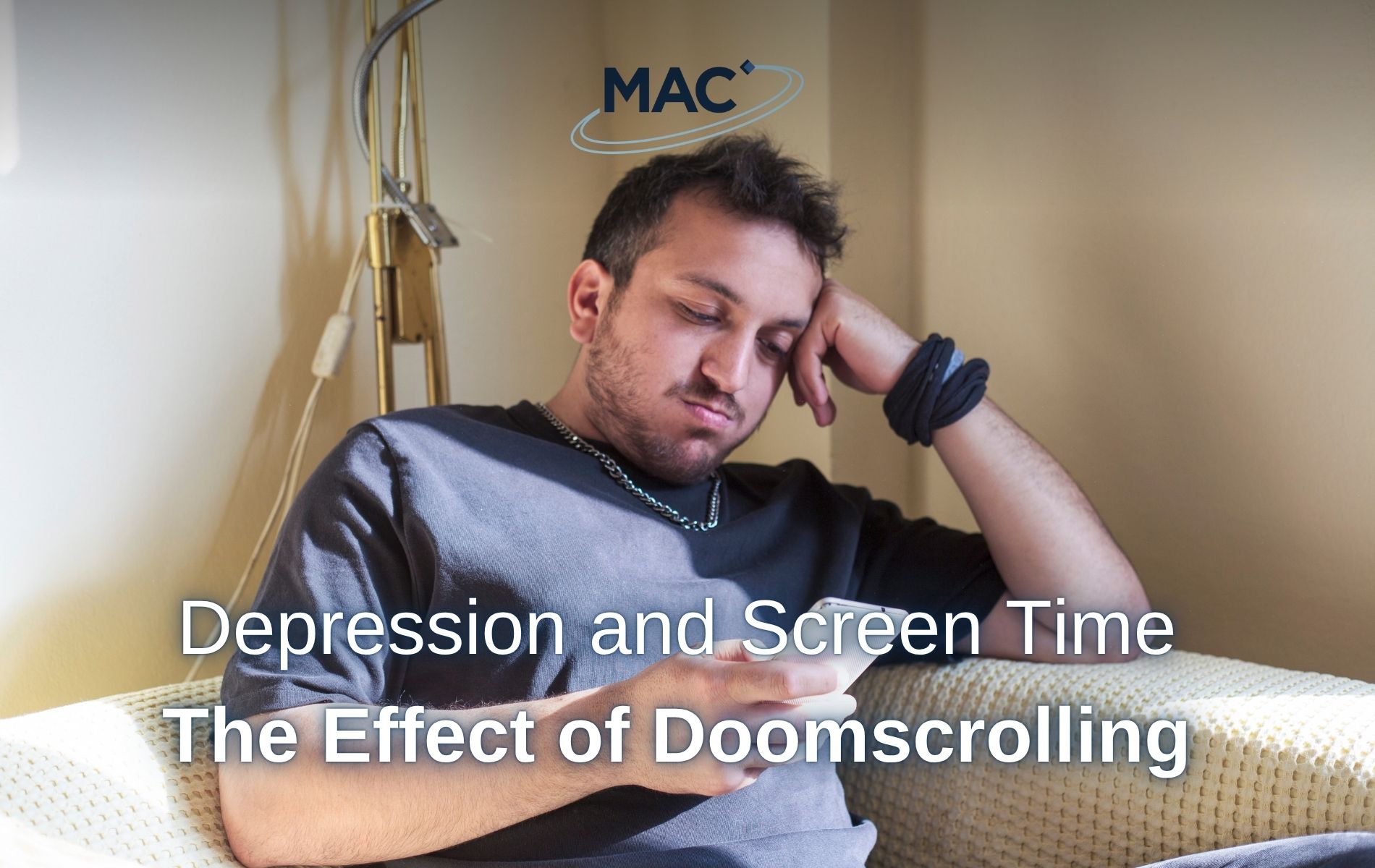The UK has one of the highest average screen times in Europe, with people spending nearly 30% of their day on their phones. This equates to around five hours and six minutes per person1. Screen time is almost unavoidable in the modern world, and as such, it has introduced new challenges, one of the most concerning being doomscrolling.
What is doomscrolling?
Doomscrolling is a term used to describe when you actively seek out upsetting or negative content online. This may leave you feeling distressed or anxious as you feel compelled to continue scrolling to avoid feeling unaware2. It can also describe screen time without a purpose, like mindlessly scrolling through reels or TikTok, reading comments sections, checking apps to feel up-to-date, and constantly checking notifications.
While curiosity about distressing news is natural, news that triggers fear and anxiety can drive us to constantly check for updates to alleviate those feelings. This compulsive behaviour may be driven by a desire to gain some control over the situation and our reaction to it, even if the behaviour often leaves us feeling worse2. Social media algorithms also tend to prioritise emotionally charged content which can keep you locked in a negative feedback loop.
The link between doomscrolling and depression
Research has shown that there is a relationship between social media use and increased feelings of anxiety and depression3. This was particularly true during the COVID-19 pandemic, where those who spent more time on pandemic-related news experienced higher levels of anxiety, distress, stress, and depression4, and reported lower levels of wellbeing5.
Doomscrolling often takes place when you may be trying to sleep. Alongside amplified feelings of anxiety and low mood that can affect healthy rest, the blue light from your phone supresses the production of melatonin—a hormone that we need to sleep; it regulates the sleep-wake cycle2. Poor sleep can leave you more vulnerable to symptoms of depression6 and can also affect physical health.
Tips for healthier screen habits
Digital devices are incredibly useful tools that allow us to connect with the wider world, but they can also be addictive. Over 50% of people in the UK spend more than one hour a week on social media2, and two out of five users say that social media has affected their mental health7. Here at MAC, we’ve pulled together some suggestions for developing a healthier relationship with your phone and social media.
- Establish clear boundaries: Designate times during the day to check your social media and news apps. It will take time to break the habit so don’t feel you have to be too strict with yourself at first but try to keep these times brief and purposeful. Avoid screens before bed and consider keeping your phone out of reach when doing other activities like your hobbies It may also be worth adjusting the accessibility settings on your device to apply a red-light filter to your screen. Red light has a longer wavelength and is therefore less likely to disrupt melatonin production, as well as making your screen less visually stimulating.
- Curate your feed: Instead of pursuing negativity, seek out content and accounts that share uplifting and positive content. Engage with pages and news that provide inspiration, enrichment, and entertainment to combat the negative cycle of doomscrolling.
- Track your behaviour: Keeping track of your doomscrolling and screen time habits is the first step towards understanding and reducing them. Find an app that works for you or make a note of your daily usage and use this information to help you set realistic goals.
- Practice mindful consumption: Before you open an app, think about what you’re hoping to gain from it. Try to also pay attention to what may trigger a spiral of doomscrolling. Once you’ve identified them, it will be easier to develop strategies to combat the effects of the triggers.
- Seek support: If you find that doomscrolling or your device usage is affecting your mental health, consider speaking to your GP or a healthcare professional. They will be able to offer support in managing your mental health and may be able to offer guidance on screen time.
Has depression taken over your life?
Depression can be alienating and isolating, and it may seem easier to live through your phone if you feel unable to join in with the world around you. If you’re feeling like a background character in your own life, it can be hard to see the point in anything, but in research, your experience is essential.
MAC Clinical Research is currently seeking patients who have been to their GP or health team with low mood or depression and would like to take part in a new study to evaluate the safety and efficacy of an investigational medicine. The study medication is thought to work by influencing certain signalling pathways in the brain that are involved in mood regulation and reward. You may receive up to £4,445 for taking part in this study. Find out more on our depression with anhedonia study page.
References
1 Opal – The State of Screen Time in the United Kingdom
2 Nuffield Health – What is ‘doomscrolling’ and how can I stop?
3 Vannucci et al. (2017) – Social media use and anxiety in emerging adults
4 Wathelet et al. (2020) – Factors Associated With Mental Health Disorders Among University Students in France Confined During the COVID-19 Pandemic
5 Buchanan et al. (2021) – Brief exposure to social media during the COVID-19 pandemic: Doom-scrolling has negative emotional consequences, but kindness-scrolling does not
6 John Hopkins Medicine – Depression and Sleep: Understanding the Connection
7 British Association for Counselling and Psychology – Two out of five social media users say it’s affected their mental health




